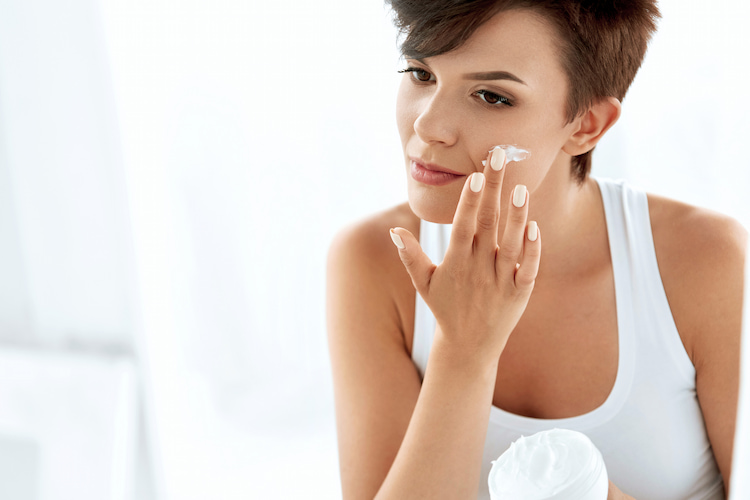Winter can be tough on your skin. The cold, dry air can leave your skin feeling rough and dull. But don’t worry; keeping your skin healthy and glowing all season is possible! In this blog, we’ll share ten easy skin care tips to help you take care of your skin during the winter months. With these tips, you’ll learn how to maintain healthy winter skin and protect it from the harsh winter elements. Let’s start with the first one and look fresh and shining this winter!
1. Moisturise Regularly with Rich Creams and Lotions
Winter air is often much drier than in other seasons, and indoor heating systems can intensify this dryness. This can lead to flaky, itchy, and irritated skin. Therefore, you should use rich creams and lotions to restore and maintain your skin’s moisture levels. These materials create a barrier that locks in hydration, helping your skin stay resilient, even in harsh conditions.
What Products to Use?
Products with ingredients like shea butter, hyaluronic acid, and ceramides are ideal. These elements are known for their deep moisturising and skin-repairing properties. Apply moisturiser immediately after bathing or washing your hands to trap moisture in your skin.
Additional Tip
Keep a small bottle of lotion with you to reapply throughout the day, especially if you’re in a heated environment. Also, for extra hydration, use an overnight moisturising mask once or twice a week.

2. Stay Hydrated: The Importance of Drinking Water
Your skin needs hydration to maintain its elasticity and moisture. In winter, you might not feel as thirsty. In spite of that, your body still needs plenty of water to function optimally. Dehydrated skin can become dry and more prone to wrinkles. Drinking water helps flush out toxins and keeps your skin cells hydrated from the inside out.
How Much Water Should I Consume Daily?
Drink at least 8 glasses of water daily, and more if you’re physically active or in a heated environment. Herbal teas and water-rich fruits and vegetables can also help meet your hydration needs.
Additional Tip
Carry a reusable water bottle with you to remind yourself to drink water throughout the day. You can also use a water tracker app to remind yourself to drink regularly.

3. Use a Humidifier to Combat Dry Indoor Air
Indoor heating systems can lower the humidity levels in your home. In this situation, a humidifier can help by adding moisture back into the air. This can prevent your skin from losing too much moisture and becoming dry. This is especially helpful in rooms where you spend a lot of time, like your bedroom or living room.
Additional Tip
Adjust the humidity level to about 40-60% for maximum comfort and skin health.

4. Protect Your Skin from Harsh Winds
The combination of cold temperatures and wind can worsen dryness and make your skin more sensitive. Therefore, it’s important to protect your skin from these elements to prevent damage and maintain your skin’s barrier function.
What Should I Wear in Cold Windy Days?
Scarves, hats, and gloves are good options to shield your skin from the wind. Wind-resistant and insulated fabrics are also necessary for better protection.
Additional Tip
Before heading outside, it pays off to apply a thick layer of moisturiser or barrier cream to exposed areas.

5. Avoid Hot Showers; Go for Lukewarm Water Instead
Hot water can remove natural oils from your skin, leading to dryness and irritation. On the other hand, lukewarm water is gentler and maintains your skin’s natural moisture barrier. Moreover, long, hot showers can intensify skin conditions like eczema and cause redness and flaking. On winter days, try to limit your shower time to 10-15 minutes and use a hydrating, non-stripping body wash or soap.
Additional Tip
Always pat your skin dry with a towel rather than rubbing it to avoid further irritation.

6. Don’t Skip Sunscreen and UV Protection Even in Winter
Ultraviolet (UV) rays from the sun can cause skin damage and increase the risk of skin cancer, even during winter months. Furthermore, snow and ice can reflect UV rays, leading to increased exposure. In this situation, sunscreen helps protect your skin from these harmful rays, keeping you away from the risk of premature ageing and other skin issues.
What Product to Use?
Apply a broad-spectrum sunscreen with at least SPF 30 to all exposed skin every day, even on cloudy days. Reapply every 2 hours if you’re spending a long time outdoors.

7. Exfoliate Gently to Remove Dead Skin Cells
Exfoliating helps remove dead skin cells that can accumulate and make your skin look dull and uneven. During winter, dead skin cells can build up more quickly due to dryness. Therefore, you need gentle exfoliation to promote healthy skin turnover and help your moisturiser absorb better.
What Products to Use?
Look for products with gentle exfoliating agents such as lactic acid or enzyme-based exfoliants.
Additional Tips
- Use a mild exfoliant once or twice a week.
- Avoid harsh scrubs or physical exfoliants that can irritate the skin.
- Follow up with a moisturiser immediately after exfoliating.

8. Wear Soft, Breathable Fabrics to Prevent Irritation
Winter clothing can sometimes be made from rough or synthetic materials that may irritate sensitive skin. Therefore, it’s important to choose clothes with soft, breathable fabrics, especially for those with sensitive or eczema-prone skin.
What Fabrics Are Soft and Breathable?
Clothes made from cotton, bamboo, or wool blends are suitable for winter days.

9. Nourish Your Skin with a Healthy Diet
It’s not always the products you use and the clothes you wear! When you have a well-balanced diet that provides you with essential nutrients, you can maintain your skin’s elasticity, moisture, and overall appearance. Vitamins, minerals, and fatty acids play crucial roles in keeping your skin nourished and resilient.
What Should I Eat to Nourish My Skin?
Consume a variety of fruits, vegetables, whole grains, and lean proteins. Foods rich in omega-3 fatty acids, antioxidants, and vitamins like A, C, and E are particularly beneficial for skin health. Here are the foods containing the necessary nutrition:
- All types of berries are high in antioxidants.
- Citrus fruits (such as oranges and grapefruits) provide vitamin C.
- Leafy greens (like spinach and kale) and orange vegetables (such as carrots and sweet potatoes) are rich in vitamins A and C.
- Almonds, walnuts, and flaxseeds contain healthy fats and vitamin E.
- Fatty fish (like salmon, mackerel, and sardines) have omega-3 fatty acids.
- Avocados provide healthy fats and vitamins E and C.
- Brown rice, quinoa, and oats have B vitamins.
10. Address Specific Skin Concerns with Targeted Treatments
Everyone’s skin is unique and may have specific needs or concerns, such as acne, dryness, or eczema. Targeted skin treatments address these specific issues more effectively than general skincare products. You should consult with a dermatologist or skin care specialist to identify your skin’s needs and to find appropriate products or treatments.
When Should I Go and See a Doctor?
Sometimes, when your skin condition gets more serious, your skincare routine and products are not enough to manage the situation. In this case, you need the help of a doctor, specifically a dermatologist. Here are the situations in which you need professional help.
- If you have ongoing issues like severe acne, eczema, psoriasis, or other chronic skin conditions that aren’t improving with over-the-counter treatments.
- If you notice new moles, changes in existing moles, or any skin lesions that change in colour, size, or shape, these could be signs of skin cancer.
- If you experience extreme dryness, redness, itching, or irritation.
- If you have signs of infection, such as redness, swelling, pus, or fever.
- If you have a severe allergic reaction, such as hives or swelling.
- If you have skin conditions causing significant pain or discomfort that affects your daily life.

Final Word
Winter can be a challenging season for maintaining healthy skin. However, with the right skincare routine and following the essential tips we discussed in this blog, you can keep your skin glowing and vibrant all season long. Remember, a little extra effort now can make a big difference in how your skin looks and feels throughout the winter months.
For personalized skin care advice and treatments, visit MHB Aesthetic Clinic. Our expert practitioners offer a range of advanced services, including CO2 Laser Treatment, HydraFacial, RF Microneedling, and Plasma Fibroblast, to address various skin concerns. These treatments are designed to rejuvenate and improve your skin’s texture, tone, and overall appearance. Please contact us today to schedule a consultation and learn more about how we can help you achieve your best skin all year round.
FAQs
Can I use the antibacterial soap on my hands?
Yes, you can use antibacterial soap on your hands. It helps kill bacteria and can be beneficial in situations where you need to ensure thorough hand hygiene, such as after using the restroom or before preparing food. However, for regular handwashing, a mild, non-antibacterial soap is usually sufficient.
Should I use bar soap or body wash for my Face?
It’s generally recommended to use a gentle facial cleanser specifically formulated for the face rather than bar soap or body wash. Bar soaps and body washes are often designed for the body and can be too harsh or drying for the more sensitive skin on your face. That said, between the two options, a gentle body wash may be a better choice over bar soap.
Is there a certain temperature I should set my thermostat to?
It’s recommended to set your thermostat between 68°F and 72°F (20°C to 22°C). This temperature range is comfortable for most people and helps prevent excessive dryness in the air, which can affect your skin.





